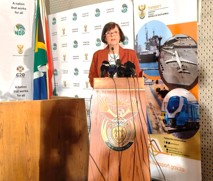
As a significant step towards opening South Africa’s rail network to private operators and reforming the rail sector, Transnet has completed the adjudication process of selecting new Train Operating Companies (TOCs).
The participation of private operators will go a long way in increasing Transnet rail volumes and assist producers in the mining and agriculture sector meet rail cargo volume expectations to exporters as well as encourage the upgrade of the rail infrastructure.
Briefing the media on the outcome of the application process for third-party participation of
TOCs onto the Transnet rail network, Minister of Transport Barbara Creecy said the Transnet Rail Infrastructure Manager (TRIM) estimates that the new TOCs will carry an additional 20 million tonnes of freight per annum from the 2026/27 financial year.“This will supplement Transnet Freight Rail’s (TFR’s) forecasted volumes and contribute to Government’s target of increasing freight moved by rail to 250m tons per annum by 2029.
“The evaluation process has been rigorous and was conducted in full compliance with the standards of fairness and transparency. Today’s announcement is not just about the allocation of rail slots - it is a step toward a future where our railways drive economic growth, job creation and sustainability,” Creecy said on Friday in Pretoria.
Of the 25 TOCs applications received, 11 have met the necessary requirements and will proceed to the next stage of negotiations and contracting.
The initial allocations, on a total of 41 routes and six corridors, are as follows:
- North Corridor: six new entrants, 15 routes for transportation of coal and chrome.
- Iron Ore Corridor: one new entrant, one route for transportation of iron ore.
- Cape Corridor: two new entrants, two routes for transportation of manganese.
- Northeast Corridor: six new entrants, 16 routes for transportation of coal, chrome, magnetite, fuel, containers.
- Central Corridor: one new entrant, two routes for transportation of coal, containers (manganese).
- Container Corridor: four new entrants, five routes for transportation of containers, coal, and sugar.
The benefits of third-party access include, among other things, improving utilisation of the network and thus increasing rail efficiency; reducing network unit costs by involving more operators; increasing revenue to contribute to investment in the maintenance and modernisation of the network, and reducing the external costs of freight logistics and improving the competitiveness of rail as a more environmentally friendly mode of transport.
“New entrants who have met the requirements will receive conditional award letters outlining award conditions, including the need to complete the Railway Safety Regulator (RSR) permit applications, rolling stock readiness, securing port offloading capacity and other operational processes.
“Durations of the allocations range from one to 10 years, and operating companies can commence with operations once the relevant conditions have been addressed,” the Minister said.
In March 2022, Cabinet approved the National Rail Policy, which lays the basis for third party participation in the Transnet Network while the infrastructure remains state owned.
“The Rail Policy encourages rolling stock investment by the operating companies and the establishment of the rolling stock leasing companies by both state-owned companies and private entities. This could be a key intervention for revitalising rolling stock and unlock as much as R100billion in new investments
“The Rail Policy advances structural reforms that enable private sector investment; optimal utilisation of the rail network and effective economic regulation that facilitates equitable access to the rail network and ensures that it is properly managed,” Creecy said.
The Roadmap for the Freight Logistics System in South Africa was approved by Cabinet on the 8 December 2023.
This document gave the Interim Rail Economic Regulatory Capacity (IRERC) the mandate to manage the consultation process on Transnet’s draft Network Statement.
“The Network Statement serves as a foundational document that outlines the terms and conditions under which operators can access the rail network, thereby giving effect to third-party access and enabling private sector participation.
“The first Network Statement and Tariff Determination were published on the 20 December 2024. The application process for slots commenced promptly after the Network Statement was gazetted in December 2024. Applications opened on 20 December 2024 and closed on 27 February 2025,” the Minister said.
TRIM will next week open applications for parties who wish to submit ad-hoc applications for additional or new route allocations for the current 2025/26 timetable period based on Volume 3 of the Network Statement on their website
“In due course, the Department of Transport will announce the date of publication of Volume 4 of the Network Statement, and when applications will open to apply for available slots for the 2026/27 timetable.
“We will also be incrementally enhancing our regulatory framework to ensure that the slot allocation process is guided by certainty and responsive to our rail reform programme,” Creecy said. -SAnews.gov.za
No comments:
Post a Comment